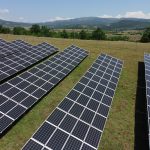MEDIA ADVISORY
What is happening? US President, Joe Biden, invited 40 World Leaders to the Leaders Summit on Climate on 22-23 April 2021. This is a critically important initiative as the first step by the US government to focus on climate action in their efforts to show that the US is back on the international level, targeting heads of states of key countries.
The summit comes at a critical juncture, with the latest UNFCCC report stating that the collective climate action pledges according to the Nationally Determined Contributions (NDCs) are far off track from the goals envisaged in the Paris Agreement, most notably to pursue efforts to limit global warming to 1.5°C above pre-industrial levels. There are also increasing calls to developed countries to step up financial support for climate action in developing countries, in particular for adaptation.
What do we want? CAN Europe views the Leader’s Summit as a critical opportunity for European leaders to bring to the table further efforts and specific commitments to put itself on a 1.5°C compatible pathway. Our four main requests for the European Commission and the European leaders participating in the summit are:
-
Emissions reductions well beyond 55%. This should be combined, with greater efforts to protect biodiversity and increase carbon removals, in line with the EU’s fair share of the global efforts to limit temperature rise to 1.5°C.
-
All Member States, Norway and the UK commit to increase climate finance for developing countries to be allocated to adaptation, with a strong priority to the least developed countries and the small island countries. The European Investment Bank should commit to scaling up adaptation finance to 50% of its climate finance for developing countries by 2025.
-
No COVID-19 recovery funding to fossil fuels, explicitly fossil gas. At EU level, this translates into keeping fossil gas and nuclear out of the EU taxonomy, budget funds and EU recovery (€1.8 trillion) spent by Member States and regions. . In assessing recovery plans, the European Commission should insist that the necessary reforms on national level, throughout all sectors are kicked-off to achieve beyond 55% emissions reduction.
-
European countries champion climate action and a green recovery in upcoming bilateral meetings and summits, including the EU-India summit, the renewed Southern Partnership and EU-Africa Partnership Strategy, by developing concrete measures to globally shift away from fossil fuels and lock in new dependencies.
For each of the European countries participating in the Leaders’ Climate Summit, CAN Europe asks are as follow:
Denmark:
-
Fossil-free COVID-19 recovery: No funds for polluters or for fossil infrastructure.
-
Climate finance for adaptation and mitigation developing countries.
-
Enhance commitment to renewable energy.
France
-
End fossil fuel subsidies nationally and abroad.
-
Increase climate finance for developing countries to €8bn/year for 2021-2025.
-
Implement all the recommendations of the citizen assembly.
-
No room for dirty investments in the French recovery plan.
Germany
-
Increase domestic emissions reduction and associated climate law to 70% by 2030 (up from 55%).
-
Adjust renewable energy expansion and other targets accordingly.
-
Double finance from the federal budget allocated to international climate finance to at least 8bn € per year by 2025.
Poland
-
Phase-out coal by 2030.
-
Adopt national 2050 climate neutrality target for Poland.
-
Unblock renewable energy potential + increase ambition.
Spain
-
No COVID-19 recovery funds for polluters.
-
Drive a real transformation in transport, agriculture and circular economy.
-
Increase climate ambition by 2030 by at least 55%.
Turkey
-
Ratify the Paris Agreement.
-
Set an ambitious target for Turkey’s emissions reduction with updated NDC.
-
Start planning decarbonisation, set a zero emission date.
Quote us:
“Five years after European countries committed to limit the global temperature rise to 1.5°C in Paris, European leaders must increase emissions reductions or we won’t manage. We are obnoxiously far off track. European countries must aim way beyond long-term commitments; we need emissions to start dramatically dropping from today.” – Wendel Trio, Director, Climate Action Network (CAN) Europe.
“This summit taking place is a good sign. But it won’t be useful as such unless it brings greater action to combat climate change; namely, increased climate finance and higher emissions reductions.” – Wendel Trio, Director, Climate Action Network (CAN) Europe.
“We see political leaders across Europe acknowledging the needs to foster climate action. However, we need to see the essence of their speeches at the heart of absolutely all their policies, budgets, priorities, decisions just a couple of green measures won’t sort out the climate crisis.” – Sven Harmeling, International Climate Policy Coordinator, Climate Action Network (CAN) Europe.
“Europe has a historical debt and should increase its climate finance for developing countries to be able to adapt to the impacts of climate change of which rich countries are largely responsible. Climate change affects us all but not equally, so mobilising more climate finance will contribute to global justice.” – Rachel Simon, Climate and Development Policy Coordinator, Climate Action Network (CAN) Europe.
–ENDS–



